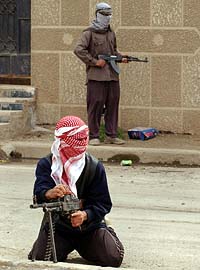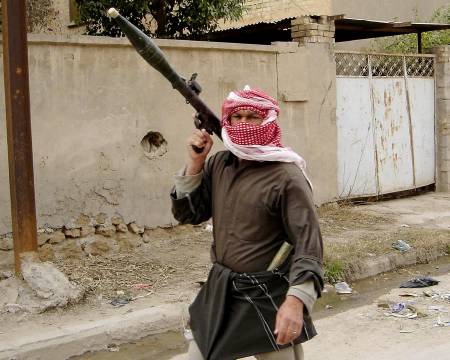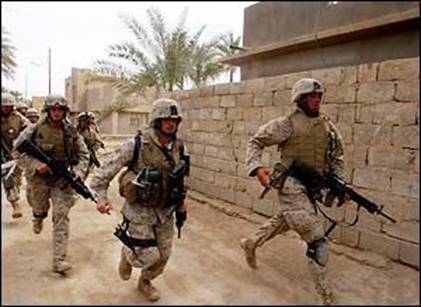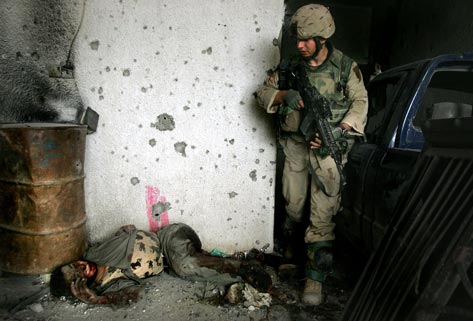Entered into the database on Friday, August 05th, 2005 @ 16:20:35 MST
Iraqi Resistance Fighters Walk the Streets of Ramadi According to reports from Iraq and from a Web Site run by the Iraqi
guerillas, U.S. forces have said that water, electricity, welfare, and other
basic services will be returned to residents of Ramadi if – and only if
– residents provide information on the bases and whereabouts of Iraqi
resistance fighters. U.S. occupation forces besieging the Iraqi town of Ramadi are using the restoration
of water and other basic services as a bargaining chip to force residents to
provide information leading to the arrest of resistance fighters, the Iraqi
Resistance Report website said, citing a story published by the Iraqi newspaper
Mafkarat al-Islam last month. IRAQI
RESISTANCE VIDEO: December, 2004, 9.8 MB, 00:04:50 "The U.S. offers to turn on water, electricity, and provide welfare if
residents inform on resistance fighters to U.S. occupation forces," the
report said. On the radio, beamed to Ramadi's residents, American forces announced
that they would stop raiding homes and mosques, open the roads to local people,
and restore electricity and drinking water only if residents provided them with
information about the locations and bases used by the resistance. The U.S. military also said in the radio announcement that it would institute
a program to employ young people and provide those who want to get married with
financial aid - if residents informed American forces about the resistance.
According to the Mafkarat al-Islam correspondent, the U.S. military made the
announcement more than six times as he filed his report, posted last Wednesday.
The report added that U.S. propaganda radio was jamming other local and international
stations to force residents to listen to their announcements. In a statement,
the U.S. military told residents that they could dial 104, a special local telephone
number, to contact occupation troops with information on the whereabouts of
Iraqi resistance fighters. The message also warned the people of Ramadi that if they failed to cooperate
with American troops, they would meet a fate similar to that of the residents
of Fallujah, which was bombed last year by the occupation forces. Similar concerns were previously reported by the U.N.'s Integrated Regional
Information Network (IRIN), after the bombardment of Fallujah. On February 24,
IRIN published a report that "Residents of Ramadi, the capital of Anbar
Province, some 100km west of Baghdad, have started to flee the city following
the latest offensive launched by U.S. Marines and the (puppet) Iraqi army." "Worried that the offensive could proceed as it did in nearby Fallujah,
where the majority of the city's population was forced to flee during a near
three-month long campaign, many Ramadi families are taking personal effects
and food supplies and heading to relatives' houses in the capital, or to the
camps where residents from Fallujah fled." IRIN said that U.S. forces imposed a cordon around Ramadi, and that most shops
in the city were closed. "[P]eople are having difficulties getting food
supplies as the offensive came quickly and without warning, giving them no time
to prepare." Fallujah "has become a ghost town. A very small fraction of the population
has returned, certainly less than 20%; most are poor, haven't the means to live
in Baghdad, and have no other place to live. "They survive in an apocalyptic landscape, in the midst of ruins and roads
blocked or clogged with burned-out cars and piles of rubble," Le Monde
reported three months after the offensive against Fallujah. "The stores are empty, looted. The hospitals have been damaged and closed.
Electricity and water service are just beginning to return. Cars are only exceptionally
permitted to enter the city. The residents live like nomads."


